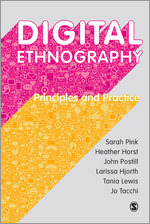
Pink, Sarah et al. 2015. “Researching Relationships”. In Digital Ethnography: Principles and Practice. London: Sage Publications. 79-99
Sage Publications In this chapter, the authors explore the diverse ways in which digital ethnography can enhanc1e our understanding of relationships. They examine how customization beyond the phone itself and the utilization of mobile phones for calls and games contribute to the complex intertwining of the digital realm with relationship maintenance. By emphasizing the significance of co-presence in sustaining relationships, they showcase numerous approaches through which digital media and technologies can foster a sense of presence across time and space. A central theme of this chapter revolves around the vital role of social and cultural context in shaping the adoption of digital media and technologies within relationships. Through ethnographic examples centered around mobile phones and their transformative impact, the authors acknowledge the importance of understanding mobile phone usage within the context of relationships rather than merely focusing on the phones’ influence on individuals in different cultural settings. It is the dynamics of relationships that determine how various types of mobile phones, including basic phones, smartphones, and mobile media, are embraced within each unique cultural, social, and relational context.
Abidin, Crystal and de Seta, Gabriele. 2020. Private “Messages from the Field: Confessions on Digital Ethnography and Its Discomforts.” Journal of Digital Social Research. 2 (1): 1-19
JDSR Abstract: This special issue collects the confessions of five digital ethnographers laying bare their methodological failures, disciplinary posturing, and ethical dilemmas. The articles are meant to serve as a counselling stations for fellow researchers who are appr oaching digital media ethnographically. On the one hand, this issue’s contributors acknowledge the rich variety of methodological articulations reflected in the lexicon of “buzzword ethnography”. On the other, they evidence how doing ethnographic research about, on, and through digital media is most often a messy, personal, highly contextual enterprise fraught with anxieties and discomforts. Through the four “private messages from the field” collected in this issue, we acknowledge the messiness, open endedness and coarseness of ethnographic research-in- the-making. In order to do this, and as a precise editorial choice made in order to sidestep the lexical turf wars and branding exercises of ‘how to’ methodological literature, we propose to recuperate two forms of ethnographic writing: Confessional ethnography (Van Maanen 2011) and self-reflection about the dilemmas of ethnographic work (Fine 1993). Laying bare our fieldwork failures, confessing our troubling epistemological choices and sharing our ways of coping with these issues becomes a precious occasion to remind ourselves of how much digital media, and the ways of researching them, are constantly in the making.
Schrooten, Mieke. 2016. “Writing eFieldnotes: Some Ethical Considerations.” Sanjek, Roger and Tratnere, Susan W. (eds.). Fieldnotes : The Makings of Anthropology in the Digital World. Philadelphia, Pennsylvania: University of Pennsylvania Press. 78-93
Penn Press The emergence of digital ethnographic research has given rise to numerous ethical concerns. The availability of digital footprints resulting from social media participation presents researchers with unprecedented opportunities. However, this unique research environment also requires a reevaluation of established understandings of research ethics. Ethnographers must adapt standard principles of protecting human subjects to a context that significantly differs from traditional face-to-face research settings. Challenges include the ease of accessing online data, the researcher’s ability to record such data without participants’ knowledge, the complexities of obtaining informed consent, and ensuring respondents’ anonymity. To address these concerns, clear guidelines for ethical online ethnographic research are essential. In this chapter, the author explores the ethical issues she encountered in her own study on the utilization of social network sites by Brazilian individuals.